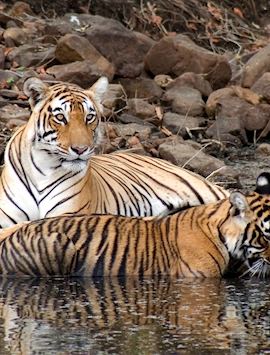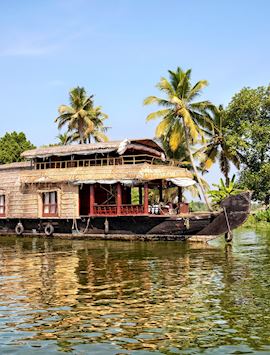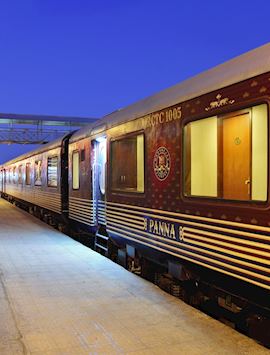Old maharajah’s palaces and Mughal forts, tiger sightings and tea gardens, intricate carvings and romantic storytelling, palm-fringed beaches, and lively bazaars, India is a country of sublime contrast.
You can delve into the soul of Indian heritage, history, and culture with routes that combine the energy of cities like Delhi, Jaipur, and Calcutta, with the calm of Kerala’s backwaters, the spirituality of the Himalaya, and the wildlife of Kanya National Park.
Whichever route you choose to take, we can plan a trip that gets you closer to India’s architecture, cultures, and cuisines. You might blend spices in a cooking class in Jaipur, taste tea on a plantation in the Himalayan foothills, or spot tigers in settings that inspired Kipling.
Along the way, you can stay in characterful properties, from a former rice barge on Kerala’s waterways to a restored hilltop fort overlooking the countryside in Rajasthan.
Choose your destination
1. India’s Golden Triangle & tigers
The Golden Triangle of Delhi, Agra, and Jaipur is often described as the best introduction to northern India. And, for good reason. Ornate palaces, hillside fortresses, and bazaars where traders ply their wares in much the same way as in centuries past — this celebrated journey is India in miniature. From seeing Agra’s Taj Mahal at sunrise to tracking Bengal tigers in a reserve, we can help you enjoy experiences far from the crowds.
Where the trip could take you: After spending time in Delhi, you can travel south to Agra’s Taj Mahal before taking a two-hour scenic train journey to Sawai Madhopur. It’s the gateway to Ranthambhore National Park, where you’ll have the opportunity to explore one of India’s largest tiger habitats. Then, it’s onto Jaipur, where your guide can help you discover the royal Pink City through local eyes.
Experiences you can have: You can take a private tour of the Taj Mahal at dawn to avoid the crowds and watch it change from a soft-pink glow at sunrise to pure white by mid-morning. Or, at sunset, visit Mehtab Bagh, a park that looks across at the Taj from the opposite bank of the Yamuna River, for an alternative perspective.
Delhi and Jaipur are brimming with artisan crafts and culinary traditions. Slip into Jaipur’s oldest bazaars with a guide to discover the embroiderers and metalsmiths who keep the city’s craft traditions alive. Ride a rickshaw through Asia’s largest spice market or join a private street-food tour to sample fresh-from-the-pan-dosas and jalebis.
To spot the elusive Bengal tiger, we recommend a safari through the Ranthambore National Park, where these endangered creatures roam the dense forests and swim in the lakes.
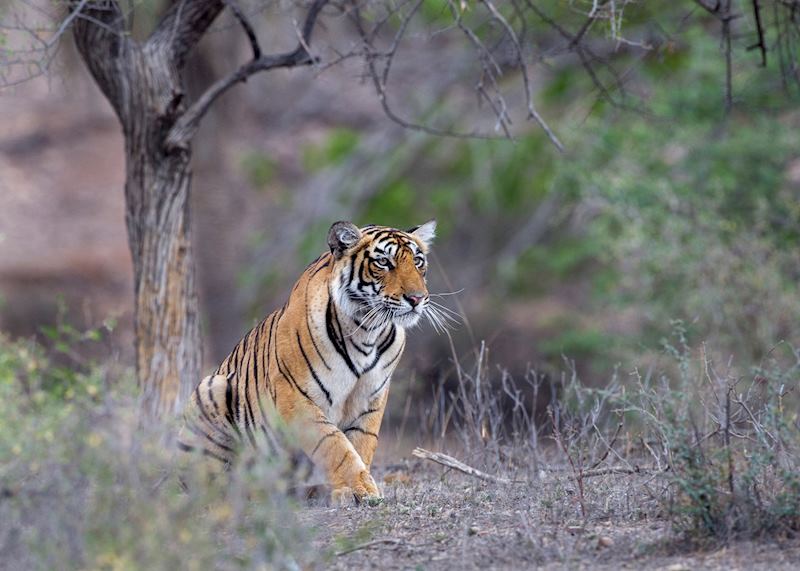
2. Classic Rajasthan tour: forts, palaces & rural villages
Sprawling from the heights of the Aravalli mountains to the dry sands of the Thar Desert, Rajasthan is dotted with architectural relics from India’s royal past. From Jaipur’s Amber Fort with its mirrored walls to the lesser-known Kumbhalgarth Fort — whose walls are the world’s longest after China’s Great Wall — you can explore their influences with a private guide.
Where the trip can take you: As the gateway to Rajasthan, Delhi is the starting point for most tours, with the option of a trip to the Taj Mahal. From here, you can journey south into Rajasthan, taking in the pink city of Jaipur, the blue city of Jodhpur, and Udaipur, the city of lakes. You could also travel to the edge of the Thar Desert, to sight wildlife, or the lesser-visited town of Deogarh.
Experiences you can have: Set high above Jodhpur like something from a fairytale, the 15th-century Mehrangarh Fort encloses a series of palaces and intricately carved courtyards leading out to views across the blue city below. You can take a guided walk down into the city, wandering stone paths, passing temples and shrines, and stopping to explore the Brahmpur quarter — the settlement of the Brahmins, India's priestly caste, whose boxy indigo houses are packed tightly together beside the narrow streets.
For a less-crowded look into Rajasthani life, we recommend a stay at Chanoud Garh, a restored fort in rural Rajasthan and home to the Singh family. Your hosts will take you to meet the village potter, guide you to salt plains for sunset vistas, and introduce you to regional homecooked food.
And, on safari in the nature reserves of Pali, you’ll head out looking for leopards, sloth bears, and over 200 species of birds.

3. India’s wildlife treasures
With its plentiful big cat population, the central Indian province of Madhya Pradesh is home to many of India’s largest national parks. From Bandhavgarh, believed to protect the highest density of tigers in the world, to Kanha, the inspiration behind Rudyard Kipling’s The Jungle Book, you’ll have the opportunity to track tigers in the wild and sight some of the world’s other rarest animals, birds, and flora, all guided by naturalists.
Where this trip can take you: Arriving in Delhi, you can delve into the capital before taking a short flight to Jabalpur, an ancient city in central India. Here, you can spend a few days at Bandhavgarh before heading to national park Kanha, a five-hour drive away. Enroute, you could stop at Ghughwa Fossil Park, whose remains date to the Mesozoic Era. Then, it’s a short flight to Mumbai to lose yourself in its energetic streets.
Experiences you can have: While Bengal tigers are Bandhavgarh’s biggest draw, there’s plenty of other wildlife worth tracking. Here, you can take wildlife drives through the park’s wet grasslands and forests filled with towering sal trees to spot leopards, Indian wild boar, and the elusive barking deer.
Also teeming with tigers, Kanha is known for inspiring the 1894 childhood classic The Jungle Book. While scattered with the breeding grounds of Kipling’s beloved animals, including the sloth bear, the reserve is most notably home to the chausingha, the only four-horned antelope in the world, and the barasingha — the rare swamp deer, saved here from extinction in one of India’s most successful wildlife conservation efforts.
The protected Baiga people also call Kanha home, and you can learn to make silver jewelry with the women who have honed their craft, passed down from mother to daughter, over centuries.

4. Classic Kerala tour: culture, tea, wildlife & backwaters
Tropical rainforests that protect herds of wild elephants. Hillsides clad in green tea plantations. Waterfalls that tumble from 25 m (80 ft). And beaches that give way to sleepy backwaters where palm trees heave with papayas, coconuts, and jackfruit. A trip around the southern state of Kerala offers a mellow introduction to India for first-timers, or a contrast if you’ve already visited the north.
Where the trip can take you: After spending time in culture-rich Cochin, you can journey east to the heart of rural Kerala before turning north to the forested slopes of the western Ghats. As you travel through these green hills, we suggest stops in Munnar with its expansive tea gardens, and Periyar, whose rainforests sustain a diverse array of wildlife, including elephants. Returning to Kerala’s coast, you might choose to get away from it all at a beach resort.
Experiences you can have: Much of Kerala’s appeal is down to its unspoilt scenery, and there are plenty of ways to experience it. You could cycle through cardamom estates in the tea town of Munnar, with far-reaching views of the mist-covered mountains, or ride to a family-run spice plantation.
Exploring from the water is among the best ways to do Kerala justice, and we recommend an overnight stay on a converted rice barge. Drifting along the brackish lagoons, lakes, and canals that make up Kerala’s palm-fringed serpentine backwaters, you might spot a white-throated kingfisher hovering over the water or glimpse a fisherman casting his net over the river like an oversize hammock.
And, if all-out relaxation is your goal, you can lie back on a near-empty stretch of soft sand and enjoy an ayurvedic massage to a backdrop of gently lapping waves. Marari Beach Resort is our best-loved choice on the Keralan coast.
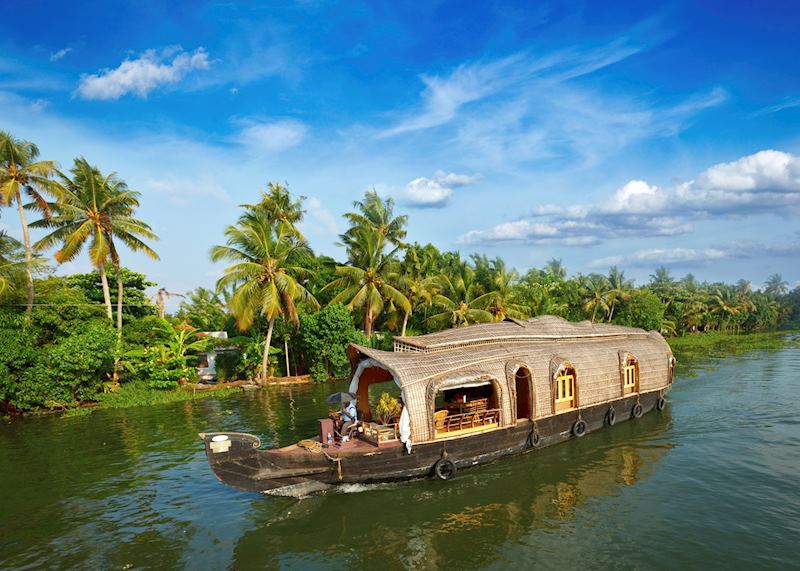
5. Western Himalaya explored
The Himalaya has long been considered a spiritual home for seekers of ancient cultures that are still very much alive. A trip to the Western Himalaya can connect you with India’s spirituality in a meaningful way, be it attending a devotional Hindu ceremony or exploring ashrams and temples on a tour of India’s yoga capital.
Where this trip can take you: Starting in Delhi, you can travel by private car north to the plains of Amritsar, in the heart of the Punjab, before journeying northeast into the forested Himalayan foothills. We suggest stopping in Dharamshala, home to the largest Tibetan temple outside of Tibet, before heading south to the hill station of Shimla. Continuing south, it’s onto the metropolis city of Chandigarh at the foot of the Sivalik hills, and finally to Haridwar, a town on the Ganges. From here, it’s just a short train ride back to Delhi.
Experiences you can have: Close to Dharamshala, the town of McLeod Ganj is the home of the Dalai Lama, you can spend time with artisans practised in Tibetan crafts, from wood carving to statue making. Or, for a glimpse into Sikh culture, take a private tour of Amritsar’s Golden Temple. You’ll visit at dusk when the gurudwara shimmers gold in the setting sun and chanting hymns echo through the marble walls as the holy scripture is put to bed. Your guide will explain this daily ritual as you watch it unfold.
And, if it’s the unspoiled scenery of the Himalaya that appeals, you can ride the Toy Train, winding your way on extremely narrow tracks for five hours through the forested foothills to Shimla, where British officials once summered during the raj. Surrounded by snow-capped peaks and green pines, it’s a great base for trekking, rafting, and fishing.

6. Luxury rail tour: Maharajas’ Express & western Rajasthan
One of India’s most culturally rich states, this land of maharajahs is a sand-spun desert world of white-marble palaces, purple hills, lakes, and fortresses that loom over painted cityscapes — blue in Jodhpur, pink in Jaipur. Taking in architectural showpieces, vibrant cities, and changing landscapes, this route combines rail and road to offer glimpses of India’s rich history, culture, and heritage — all while you’re being pampered in luxury.
Where this trip can take you: After spending a couple of days in Delhi, you can enjoy slow, luxurious travel aboard the Maharajas’ Express as you tour the Golden Triangle. We suggest stops in Agra and Ranthambore National Park before disembarking in Jaipur. From here, you can fly to Jodhpur, and then head south with a private driver to Udaipur, with suggested visits to rural villages, the Jain Temple, and the fortress at Kumbhalgarh. Then, you’ll take the short flight back to Delhi.
Experiences you can have: Rolling through Rajasthan aboard a train inspired by the imperial carriages once used by the maharajahs, you’re served regional fare in fine-dining style as long stretches of yellow plains give way to golden dunes, jungle scenery, and pink sandstone fortresses.
Along the journey, you can visit Mughal forts, palaces, and temples. From Amber Fort’s soaring flame-hued walls to Udaipur’s floating palace with its sweep of courtyards inlaid with mirrors and mosaics, you’ll gain a glimpse into Rajasthan’s royal past.
You can dine in a city palace in Jaipur or take in the twinkling lights of Udaipur from a different perspective with a private sunset boat ride on Lake Pichola.
For a taste of life today, you might explore Jaipur’s maze of bazaars with its thriving artisan communities and street-food scene to sample spicy chaat and creamy lassis. Alternatively, we can transport you to Rajasthan’s rural heartland to stay in a restored fort with a local family, who’ll dish up warm hospitality and homemade food.
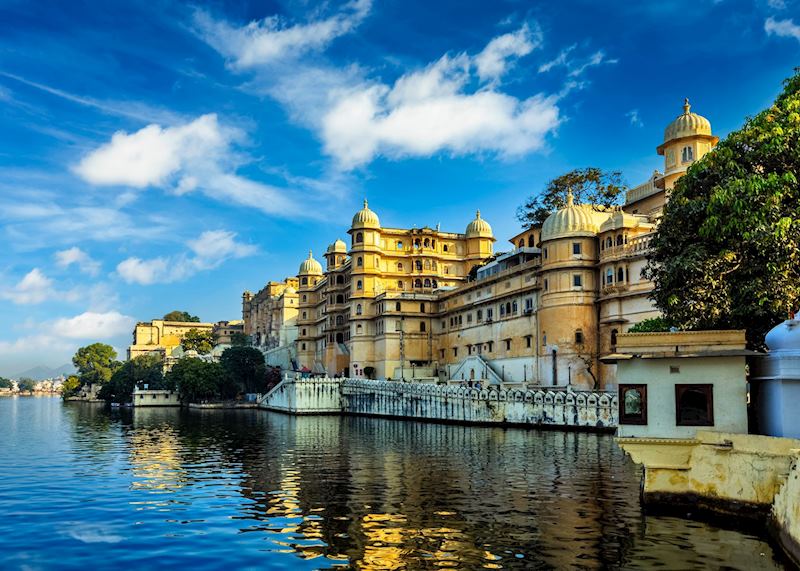
7. Kerala & the Maldives
India is undoubtedly chaotic in parts. But, if you’d like a more tranquil experience, we suggest combining the culture and cuisine of Kerala’s backwaters and tea plantations before unwinding in the Maldives. Here, surrounded by silvery sands, cerulean waters, and rich coral reefs, you can flit between relaxing, and activities as varied as dolphin spotting and a beachside massage.
Where this trip can take you: This circular route of Kerala starts on the coast and takes you inland to the forested hills of the western Ghats, south to the jungles of Thekkady, and then back to the coast. We suggest spending time in the old port city of Cochin and the tea town of Munnar. Then, you can catch the two-hour flight to Malé, where a speedboat will whisk you across the Indian Ocean to Maldivian island Velassaru.
Experiences you can have: Over the misty hills of Munnar, tea plantations stretch as far as the eye can see. Here, you can bump around the hills in a 4x4, ride a tuk-tuk along less-trodden trails to meet the ‘pluckers’, or take a private tea tour — where you’ll learn the art of leaf picking and the science of tea packaging.
Moving from cardamom to cinnamon, the hills and valleys of Thekkady are ripe with spice, and you can visit a plantation for guided tours, tastings, and cooking classes. To appreciate the breadth and depth of India’s spices, tuck into a fiery fish curry, best cooked in a meen chuttey (earthen pot), served aboard a rice barge as you tour the Keralan backwaters.
As for the rest of your trip, you can spend your time blissfully cast away in the Maldives on Velassaru, punctuating days on the white-sand beach with treatments at the overwater spa or joining a marine biologist to explore the offshore reef.
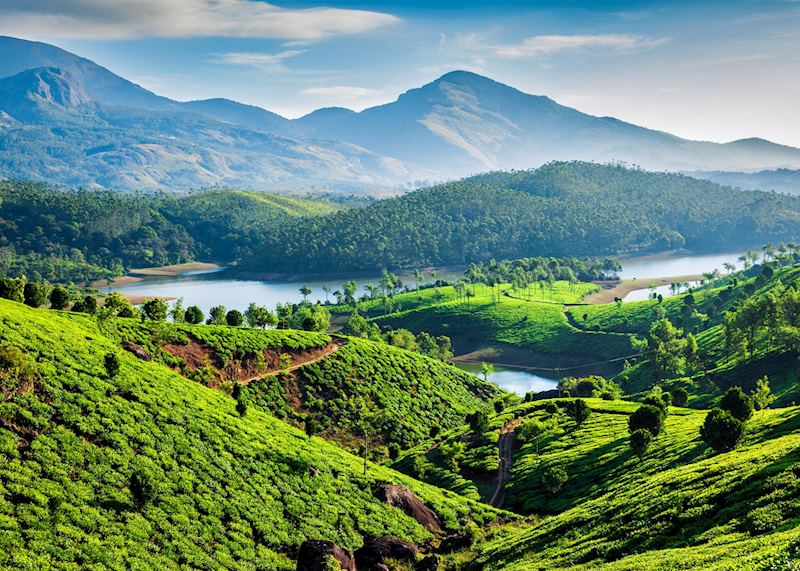
8. South India’s temples & backwaters
From plantations rich in spice to temples carved out of rock, this tour gets to the heart of South India’s heritage and culture, both ancient and modern. It balances adventure and relaxation and combines the energy of city life with the serenity of rural villages and the Keralan backwaters.
Where this trip can take you: Flying into Chennai, you’ll journey down the southeast coast with a private driver passing salt flats and beaches. We suggest stops at UNESCO-listed Mahabalipuram and the former French enclave of Pondicherry. Then, you can travel inland cross-country to the Keralan coast, with recommended visits to Tanjore, Chettinad, and Madurai, before spending time in Cochin, Kerala's culture-rich coastal capital.
Experiences you can have: While Cochin often steals the cultural spotlight, you’ll find a rival in Mahabalipuram on India’s lesser-visited east coast, along the Bay of Bengal. You can tour this UNESCO World Heritage Site with a private guide, who’ll tell you more about the history of its intricately carved temples and monolithic sculptures carved from rock.
We can also show you temples in quieter settings, like the Rock Fort Temple in Trichy, where you can climb the 437 steps cut into the stone to the top.
In Kerala’s eclectic art capital, Cochin, you’ll have the opportunity to visit a gallery where showcased work is drawn by specially abled artists, by foot or mouth. You can also discover the art of storytelling through movement at the home of a Bharatnatyam dancer or learn the intricate craft of embroidery from a skilled artisan.

9. South India: from western Ghats to the coast
Sacred temple towns and intricate wood carvings, sprawling tea gardens and authentic village life, mist-kissed jungles where elephants reign supreme. This journey south through tea country and mountain ranges is geared toward total immersion in nature and culture. You’ll take tours of botanical gardens, backwaters, and palaces, and get the opportunity to delve deep into Indian culture with a traditional Kathakali performance or Keralan-inflected dinner aboard a floating rice barge.
Where this trip can take you: Arriving in Bangalore, you might spend a few days absorbing the city’s energy before a private driver whisks you south to the western Ghats. En route, you can visit the city of Mysore with its more than 200 heritage buildings before heading inland to Nagarhole National Park to sight wildlife. You’ll also take a train ride through the Nilgiri Mountains, passing sprawling tea plantations. Then, it’s a five-hour journey to the coast for some relaxation among the backwaters and beaches of Kerala.
Experiences you can have: South India is renowned for its temple architecture and intricate carvings, and you’ll find plenty of this in Mysore, the city of silk, sandalwood, palaces, and horse carriages. Among its highlights, the City Palace is one of India’s largest and a blend of Islamic, Hindu, Gothic, and Rajput design. You can take a private tour to meet the artisans behind the palace’s ornate artworks or visit on a Sunday to see it lit up like something from a fairytale.
Alternatively, embrace the region’s natural scenery by trundling through the forest-cloaked Nilgiri Mountains aboard the Blue Mountain Railway train, passing emerald-green tea plantations and a string of lively hill stations. Or, on a boat cruise through Nagarhole National Park, spotting the herds of elephants that roam the swampland and visiting villages dotting the reserve to meet locals as they practise ancient skills like wood carving.
If you’re looking for all-out relaxation, you can cruise Kerala’s tranquil backwaters while a private chef dishes up authentic cuisine, or kick back on golden sands surrounded by coconut groves in the small fishing village of Maraikulam.
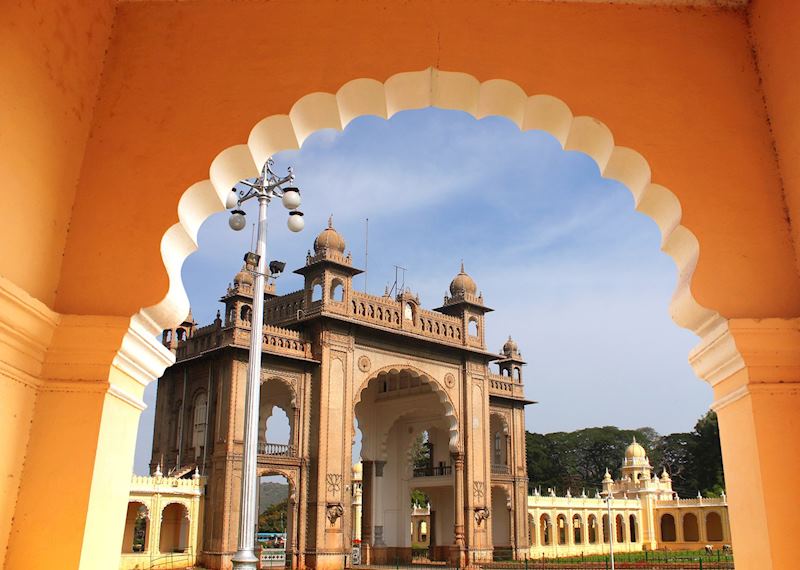
10. Cruising in west Bengal
Journeying upstream on the Lower Ganges through Bengal by boat opens a treasure trove of history, culture, and wildlife. You’ll see remnants of the region’s colonial past alongside terracotta temples, remote villages juxtaposed by bustling cities and have the chance to observe rural life in riverbank villages and towns. Local guides can also shed light on historic temples, tombs, mosques, and gardens, giving you a better understanding of India’s journey to independence.
Where this trip can take you: Spend a couple of days in Calcutta before boarding your river boat. You’ll cruise north along the Hugli River into west Bengal, where the scenery becomes rural. En route, you can spend time in Kalna and the shoreside village of Matiari. You might also visit Murshidabad to see its grand palace, Baranagar with its many temples, and explore Gaur, a ruined medieval city on the India-Bangladesh border. Then, you’ll take a seven-hour train journey back to Calcutta.
Experiences you can have: Both regal and ramshackle, Calcutta has countless stories to tell — we can arrange a walking tour of the city that matches your interests. You could take in the architectural styles that make up Bengali culture, wander the workshops of artisans who craft Hindu deities from straw and clay in intricate detail, or explore the century-old Mallick Ghat, one of Asia’s largest flower markets whose marigolds and sunflowers spill out along the riverbank.
The banks of the Hugli are littered with vestiges of its many settlers, and on your leisurely river cruise you’ll gain insight into the region’s cultural lineage, touring temples, tombs, churches, palaces, mosques, Mughal-style gardens, and battlefields.
If walking isn’t your bag, we could arrange a private rickshaw cycle tour around Kalna to explore its many terracotta temples. Or, for a more intimate experience, meet the craftspeople who beat out brass water pots in the riverside village of Motihari.
You’ll have plenty of time to relax on board the boat, looking out over mustard fields, mango orchards, and riverbank activity from the deck or indulging in a massage at the spa.
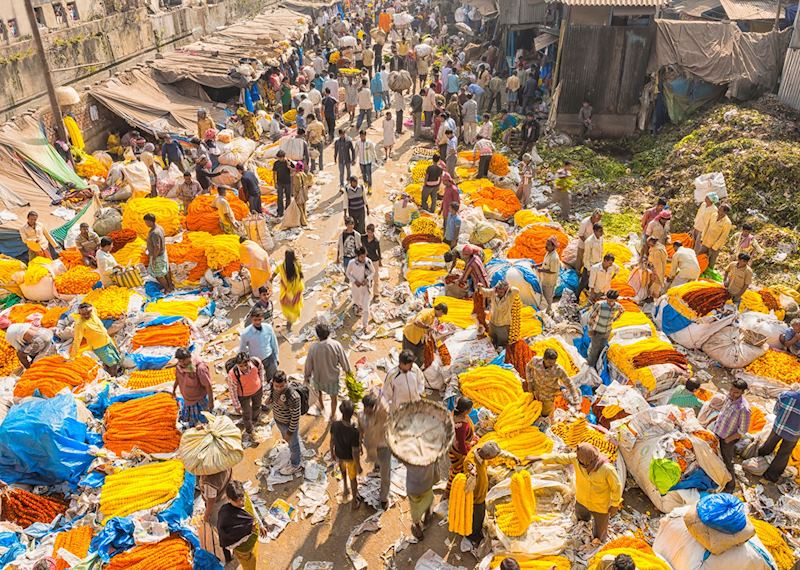
Read more about trips to India
Start thinking about your experience. These itineraries are simply suggestions for how you could enjoy some of the same experiences as our specialists. They're just for inspiration, because your trip will be created around your particular tastes.
View All Tours in India
